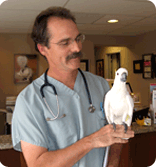Questions regarding an injured young parrot

Dear Sir, I would be very much obliged if you kindly go through the contents of my letter and advise me the medical course to be followed.
We are three in my family based in Bhopal, MP and about five years back my daughter brought one baby bird (parrot) and since then we have been so fond of parrot that in today’s condition it is really unbelievable that we cannot live without parrot with us.
Today we have four parrots and two love birds in our fault and they all remain open out of their cage and their presence at all places in my small flat is felt. Things so far was very very enjoyable for us. About 15 days back we have added one more baby bird (parrot)who is hardly 25 / 27 days old and feathers have just started appearing all around body. We were taking extreme care for his growth, but one unfortunate incidence which happened on 22.02.08 (6-20 p.m.)has changed the total environment of my family.
The baby bird fell from our hand at an approximate height of 6 ft straight on to the floor and since then he has been struggling. Immediately after the incidence I rushed to a medical centre and based on their advice I gave 1/2 Ciproflox 250 mg and combiflem 1/2 which he vomited immediately and the condition of the said bird detoriating. After about one hour we took him to a nearby doctor of a dog and other pet centre where he was administered an injection containing medicines (vetcort .2 ml I/M + Melonex .2 mg I/M). This was the course of medicines that were applied on him on the day of incidence. The doctor said that it needed a life saving drugs that’s why this injection was given and if god wants it will regain its normalcy. Next day morning after seeing him struggle for the entire night we again took him to the same doctor who after thoroughly checking the baby bird (parrot) confirmed that there has been several internal injuries in the lower part of its body as it had straight fallen from a height of 6 ft and couldn’t take off his weight by opening his wing at the time of fall, otherwise part of his weight could have been absorbed. There has only a few feathers that have so far appeared in his body is in upper part of the body covering his wings which is not enough for flying. There may be several fractures in his neck and the abdominal zones. Doctor applied spray around his body to soothe his pain and also multivitan syrup was given thrice on the next including glucon D and from evening the combination of Ceflixime and ibugesic plus syrup @ 2 drops each are being given three times. It seems he has little improved but in our opinion he is still in danger.
We want him back like other days and would be very much thankful if you could advise us the name of medicines that could better work at this moment and the name if there is any doctor available in Bhopal. We are constantly monitoring the situation but unable to do anything more because of non availability of any scope in Bhopal. Meanwhile, in three days besides several vomiting, it had toilet twice, today and yesterday which was full of clotted blood. We cannot measure whether he is still having bleeding inside. Since you are associated with a cause that’s simply best so far as we are concerned we feel we must seek your guidance in the matter. Can you really advise me as what I can do right now and the details of medicines that the baby bird needs a t the moment. I am eagerly awaiting your reply in the matter, for which myself and my family would personally remain ever thankful to you and your organization.

I hope your little bird has continued to recover from its injuries with the supportive care advice that Phoebe G. had provided.
Looking back through your description of clinical signs, treatments administered and how this bird was doing, there are concerns that come to my mind but these would be most realistically tempered by the response of this bird to nursing and supportive care. 1/2 of a tablet of Ciprofloxacin would be about 125 mg, which would be the dose typically administered to a 6 kilogram bird, and no parrots are in this large of a weight range. Presuming that this youngster is a typical youngster, that dose should have been considerably higher than optimally desired. When administered in a tablet form, sometimes these products lodge in the esophagus, and cause mechanical irritation, which theoretically could have a role with the continued discomfort in swallowing that you describe with this young chick. I am not familiar with the specific brand names or drug concentrations mentioned (Vetcort and Melonex), and cannot comment on their potential merit or problems. Many products ending with “cort” are cortisone or corticosteriod drugs, which generally are not recommended for use in birds, particularly in youngsters. Sometimes, in an urgent “life saving” situation, however, these types of drugs may be used. Your greatest probability of this chick recovering from a mechanical injury will be through simple supportive care, and not through the use of drugs, overall. Fluid support (administered by gavage or parenterally) is huge in this regard, as is the delivery of good nutrition and warmth. I hope this bird has recovered, and wish you the best. Thanks so much for trying so hard to help this feathered soul.

































